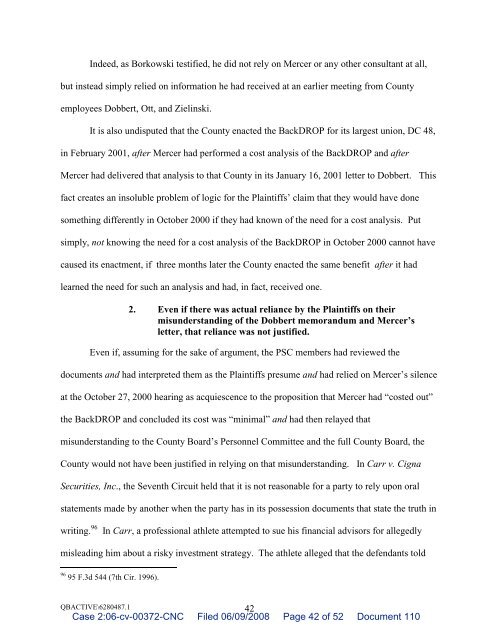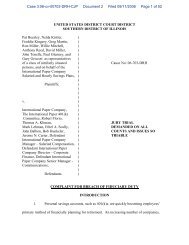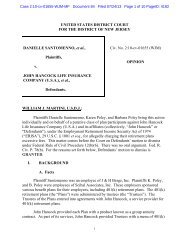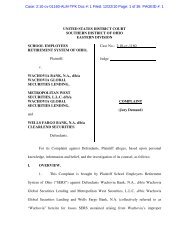eastern district of wisconsin milwaukee county, employee
eastern district of wisconsin milwaukee county, employee
eastern district of wisconsin milwaukee county, employee
You also want an ePaper? Increase the reach of your titles
YUMPU automatically turns print PDFs into web optimized ePapers that Google loves.
Indeed, as Borkowski testified, he did not rely on Mercer or any other consultant at all,<br />
but instead simply relied on information he had received at an earlier meeting from County<br />
<strong>employee</strong>s Dobbert, Ott, and Zielinski.<br />
It is also undisputed that the County enacted the BackDROP for its largest union, DC 48,<br />
in February 2001, after Mercer had performed a cost analysis <strong>of</strong> the BackDROP and after<br />
Mercer had delivered that analysis to that County in its January 16, 2001 letter to Dobbert. This<br />
fact creates an insoluble problem <strong>of</strong> logic for the Plaintiffs’ claim that they would have done<br />
something differently in October 2000 if they had known <strong>of</strong> the need for a cost analysis. Put<br />
simply, not knowing the need for a cost analysis <strong>of</strong> the BackDROP in October 2000 cannot have<br />
caused its enactment, if three months later the County enacted the same benefit after it had<br />
learned the need for such an analysis and had, in fact, received one.<br />
2. Even if there was actual reliance by the Plaintiffs on their<br />
misunderstanding <strong>of</strong> the Dobbert memorandum and Mercer’s<br />
letter, that reliance was not justified.<br />
Even if, assuming for the sake <strong>of</strong> argument, the PSC members had reviewed the<br />
documents and had interpreted them as the Plaintiffs presume and had relied on Mercer’s silence<br />
at the October 27, 2000 hearing as acquiescence to the proposition that Mercer had “costed out”<br />
the BackDROP and concluded its cost was “minimal” and had then relayed that<br />
misunderstanding to the County Board’s Personnel Committee and the full County Board, the<br />
County would not have been justified in relying on that misunderstanding. In Carr v. Cigna<br />
Securities, Inc., the Seventh Circuit held that it is not reasonable for a party to rely upon oral<br />
statements made by another when the party has in its possession documents that state the truth in<br />
writing. 96 In Carr, a pr<strong>of</strong>essional athlete attempted to sue his financial advisors for allegedly<br />
misleading him about a risky investment strategy. The athlete alleged that the defendants told<br />
96 95 F.3d 544 (7th Cir. 1996).<br />
QBACTIVE\6280487.1 42<br />
Case 2:06-cv-00372-CNC Filed 06/09/2008 Page 42 <strong>of</strong> 52 Document 110







